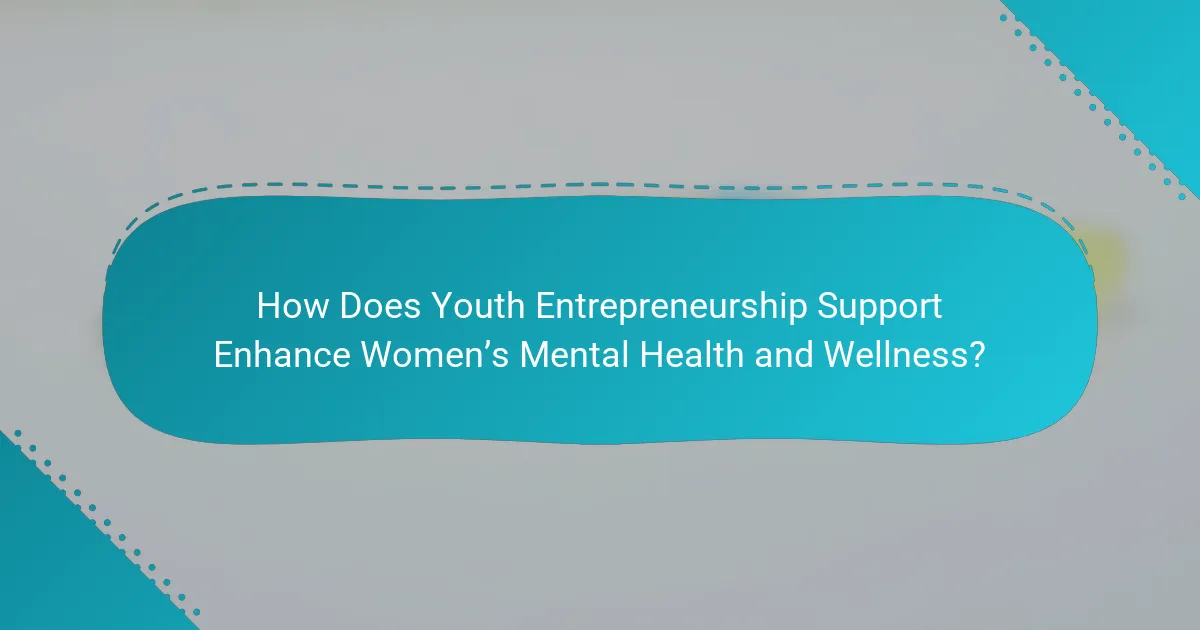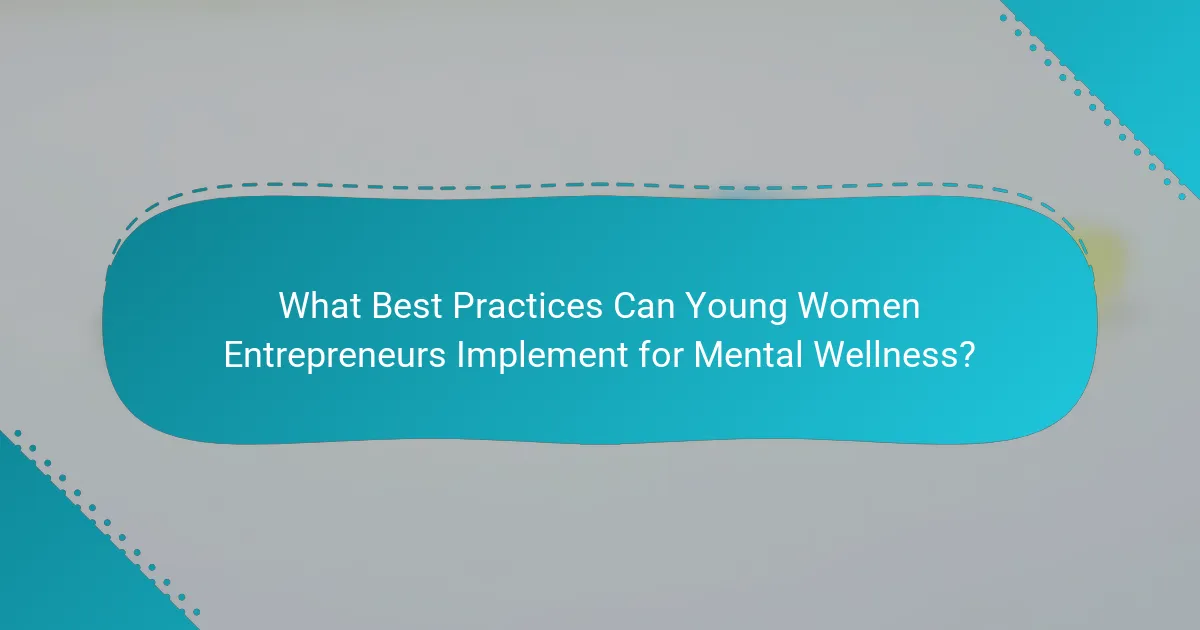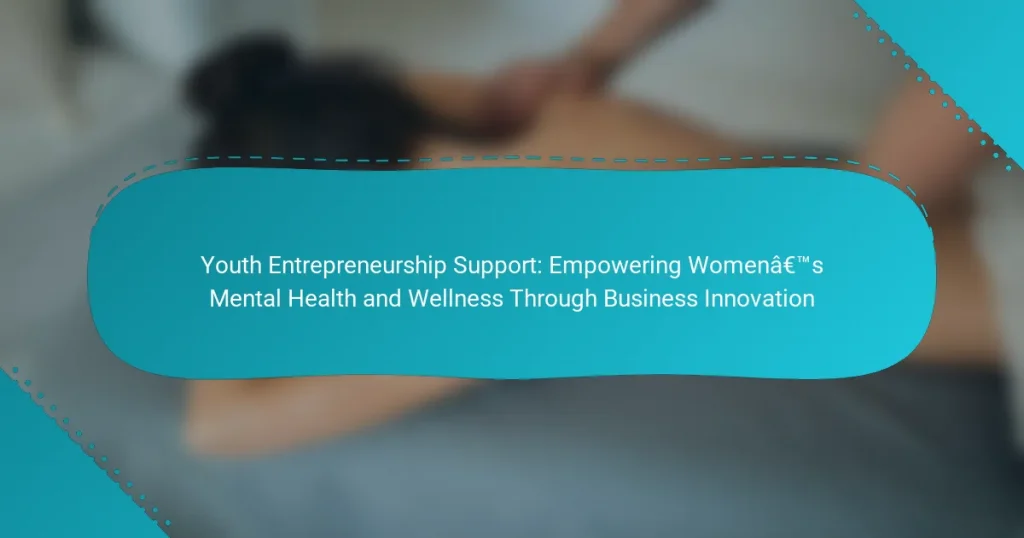Youth entrepreneurship support significantly enhances women’s mental health and wellness by fostering independence and confidence. This article explores how business activities promote purpose and reduce anxiety, the unique challenges young women entrepreneurs face, and the importance of mentorship and supportive networks. It also highlights best practices for mental wellness and the impact of community engagement on business success. Comprehensive support systems drive innovation while contributing to emotional resilience among women entrepreneurs.

How Does Youth Entrepreneurship Support Enhance Women’s Mental Health and Wellness?
Youth entrepreneurship support enhances women’s mental health and wellness by fostering independence and confidence. Engaging in business activities promotes a sense of purpose, reduces anxiety, and encourages social connections. Programs that provide mentorship and resources have shown to improve emotional resilience among women entrepreneurs. Access to supportive networks can lead to better mental health outcomes, as women share experiences and strategies for overcoming challenges.
What are the psychological benefits of entrepreneurship for women?
Entrepreneurship offers significant psychological benefits for women, enhancing mental health and fostering resilience. Engaging in business innovation boosts self-esteem, promotes autonomy, and cultivates a sense of purpose. Research indicates that women entrepreneurs often experience improved stress management and increased social connections, which contribute positively to overall well-being. Additionally, entrepreneurial activities can lead to greater financial independence, further enhancing mental wellness. These factors collectively empower women, reinforcing their mental health through the entrepreneurial journey.
How does starting a business contribute to self-esteem and empowerment?
Starting a business significantly enhances self-esteem and empowerment among youth, particularly women. Entrepreneurship fosters skills, independence, and a sense of achievement. Engaging in business innovation boosts confidence by providing opportunities for personal growth and community impact. Research indicates that women entrepreneurs report higher levels of satisfaction and mental wellness. This empowerment through entrepreneurship creates a positive feedback loop, reinforcing self-worth and resilience.
What role does financial independence play in mental wellness?
Financial independence significantly enhances mental wellness by fostering self-esteem and reducing stress. Empowering women through youth entrepreneurship creates opportunities for control over finances, leading to improved mental health outcomes. Studies indicate that financial stability correlates with lower anxiety levels and greater life satisfaction. Additionally, the unique attribute of entrepreneurship allows women to innovate, express creativity, and build supportive networks, further promoting mental wellness.
How can community support networks impact mental health?
Community support networks significantly enhance mental health among women by fostering empowerment through youth entrepreneurship. These networks provide resources, mentorship, and a sense of belonging, which are crucial for mental wellness. Studies indicate that women engaged in entrepreneurial activities report higher self-esteem and reduced anxiety levels. Furthermore, collaboration within these networks encourages sharing experiences and solutions, reinforcing resilience. As a result, women can innovate and thrive in business, positively impacting their mental health and overall well-being.
What types of mentorship programs are available for young women entrepreneurs?
Various mentorship programs exist for young women entrepreneurs, focusing on business skills and personal development. Notable types include peer mentorship, where women support each other; formal mentorship, pairing experienced entrepreneurs with novices; and industry-specific mentorship, targeting sectors like tech or health. Programs often emphasize mental health and wellness, fostering resilience and innovation. Organizations like SCORE and the Women’s Business Center provide resources and networking opportunities, enhancing access to funding and guidance. These initiatives empower young women, promoting sustainable business practices and personal growth.

What Unique Challenges Do Young Women Entrepreneurs Face?
Young women entrepreneurs face unique challenges such as limited access to funding, societal expectations, and balancing personal responsibilities. These factors can impact their mental health and overall business success. Access to mentorship programs can significantly improve their resilience and business acumen. Statistics show that women-led businesses receive only 2% of venture capital funding, highlighting systemic barriers. Support networks focusing on mental wellness can empower these entrepreneurs to innovate and thrive.
How do societal expectations affect women in business?
Societal expectations significantly hinder women’s advancement in business. These pressures often dictate traditional roles, limiting opportunities for innovation and leadership. Research indicates that women entrepreneurs face bias, impacting their mental health and business success. Empowering women through supportive networks can enhance resilience and foster innovative business practices.
What barriers to entry exist for young women in entrepreneurship?
Young women face several barriers to entry in entrepreneurship, including access to funding, lack of mentorship, and societal biases. Limited financial resources hinder their ability to start businesses. Research shows that women entrepreneurs receive less venture capital compared to their male counterparts. Moreover, the absence of role models and mentors can affect their confidence and knowledge in navigating the business landscape. Societal expectations and stereotypes may further discourage young women from pursuing entrepreneurial ventures. Addressing these barriers is essential for fostering an inclusive entrepreneurial ecosystem that supports women’s mental health and wellness.
How does access to funding differ for women entrepreneurs?
Access to funding for women entrepreneurs often differs significantly from their male counterparts due to systemic barriers. Women face challenges such as lower access to networks, fewer mentorship opportunities, and biases in investment decisions. For example, studies show that women-led startups receive only a fraction of venture capital compared to those led by men, highlighting a unique attribute of gender disparity in funding. Additionally, women entrepreneurs may experience longer wait times for loans due to perceived risk, impacting their business innovation and mental health support. Addressing these issues is crucial for empowering women in entrepreneurship.
What impact does gender bias have on business opportunities?
Gender bias significantly limits business opportunities for women. It affects access to funding, networking, and mentorship, which are crucial for entrepreneurial success. Studies show that women-led businesses receive only a fraction of venture capital compared to their male counterparts, impacting growth potential. Addressing gender bias can enhance women’s mental health and wellness, fostering a more inclusive entrepreneurial landscape. Empowering women through targeted support can lead to innovative business solutions and improved economic outcomes.

What Are the Universal Attributes of Effective Youth Entrepreneurship Support?
Effective youth entrepreneurship support focuses on empowering young individuals through mentorship, access to resources, and fostering a supportive community. Key attributes include tailored training programs, financial literacy education, networking opportunities, and access to funding.
These attributes enhance entrepreneurial skills, boost confidence, and improve mental health by providing a sense of purpose. Studies show that youth entrepreneurship can reduce anxiety and depression by promoting resilience and self-efficacy.
A unique attribute of effective support systems is their ability to adapt to local contexts, addressing specific community needs. This localized approach ensures that programs resonate with participants, enhancing engagement and success rates.
As a result, comprehensive youth entrepreneurship support not only drives business innovation but also contributes significantly to the mental health and wellness of young entrepreneurs.
What essential resources are needed for young women entrepreneurs?
Young women entrepreneurs need access to mentorship, funding, networking opportunities, and resources focused on mental health. Mentorship provides guidance and support, while funding helps launch and sustain businesses. Networking fosters connections that can lead to collaborations and partnerships. Resources for mental health promote well-being, enabling entrepreneurs to manage stress and maintain resilience. These elements collectively empower women to innovate and thrive in their business ventures.
How can educational programs be tailored to support women’s mental health?
Educational programs can be tailored to support women’s mental health by integrating entrepreneurship skills and wellness strategies. These programs can offer workshops focusing on business innovation, which empower women to build confidence and resilience.
For example, mentorship opportunities can connect aspiring female entrepreneurs with experienced business leaders, fostering a supportive network. Additionally, incorporating mental health resources, such as stress management techniques and self-care practices, can enhance overall well-being.
Programs should also emphasize the unique challenges women face in entrepreneurship, addressing barriers like access to funding and work-life balance. By providing targeted support, educational initiatives can significantly contribute to improving women’s mental health through empowerment and community building.
What role do workshops and training play in skill development?
Workshops and training are essential for skill development in youth entrepreneurship, particularly for empowering women’s mental health and wellness. These programs provide practical knowledge, enhance confidence, and foster a supportive community. Engaging in hands-on activities helps participants develop critical thinking and problem-solving skills. Moreover, workshops often incorporate unique attributes such as mentorship, which can significantly impact personal and professional growth. As a result, these initiatives contribute to sustainable business innovation and improved mental health outcomes for women.
How important is networking for young women in business?
Networking is crucial for young women in business, enhancing opportunities and support. It fosters collaboration, mentorship, and resource sharing, significantly impacting mental health and wellness. Studies show that women who network effectively report higher confidence and lower stress levels. Building connections can lead to innovative business ideas and partnerships, empowering women to thrive in their entrepreneurial journeys.

What Rare Attributes Contribute to Successful Women-Led Businesses?
Successful women-led businesses often exhibit unique attributes such as resilience, innovative thinking, and community engagement. These rare qualities empower women entrepreneurs to overcome challenges and foster mental health and wellness in their ventures. Resilience allows them to navigate setbacks, while innovative thinking drives creative solutions that address market needs. Community engagement enhances support networks, contributing to both personal well-being and business success. These attributes collectively create a robust foundation for sustainable growth and impact in youth entrepreneurship.
How do innovative business models affect mental health outcomes?
Innovative business models enhance mental health outcomes by fostering resilience and empowerment among women entrepreneurs. These models provide financial independence, social support networks, and skill development, which contribute to improved mental well-being. Research indicates that entrepreneurship can reduce anxiety and depression by promoting a sense of purpose and achievement. Additionally, supportive business environments can address unique challenges faced by women, further enhancing their mental health.
What unique leadership styles are prevalent among women entrepreneurs?
Women entrepreneurs often exhibit unique leadership styles characterized by collaboration, empathy, and resilience. These styles foster innovation and support mental health and wellness in business environments. Research indicates that women leaders prioritize team cohesion and emotional intelligence, which enhances workplace morale and productivity. Additionally, women entrepreneurs are more likely to embrace adaptive leadership, allowing them to navigate challenges effectively while promoting a supportive culture. This approach not only empowers their teams but also contributes to overall business success.

What Best Practices Can Young Women Entrepreneurs Implement for Mental Wellness?
Young women entrepreneurs can implement several best practices for mental wellness, including establishing a support network, setting boundaries, and practicing self-care. These strategies foster resilience and promote a healthier work-life balance.
Building a support network allows for sharing experiences and receiving encouragement. Engaging with mentors, peers, and professional organizations can enhance emotional well-being. Setting boundaries helps manage stress by delineating work and personal life, preventing burnout. Practicing self-care through regular exercise, mindfulness, and hobbies contributes to mental clarity and emotional stability.
Research indicates that women entrepreneurs often face unique challenges, making mental wellness practices crucial. Prioritizing mental health not only enhances personal well-being but also positively impacts business success.
How can self-care be integrated into the entrepreneurial journey?
Integrating self-care into the entrepreneurial journey enhances resilience and mental health for women entrepreneurs. Prioritizing self-care leads to improved decision-making and creativity. Strategies include setting boundaries, scheduling regular breaks, and engaging in mindfulness practices. These actions foster a supportive environment that encourages innovation and personal well-being.
What common mistakes should young women avoid in entrepreneurship?
Young women in entrepreneurship should avoid common mistakes that hinder success. These include underestimating market research, neglecting networking opportunities, and failing to prioritize mental health.
1. Underestimating market research can lead to misguided business decisions. Understanding target audiences and competitors is crucial for innovation and growth.
2. Neglecting networking opportunities limits access to resources and mentorship. Building relationships can enhance visibility and provide support.
3. Failing to prioritize mental health can lead to burnout. Maintaining well-being is essential for sustained creativity and productivity.
By recognizing and addressing these mistakes, young women can better navigate the entrepreneurial landscape.
What strategies can enhance resilience and mental fortitude?
To enhance resilience and mental fortitude in youth entrepreneurship, focus on building supportive networks, fostering emotional intelligence, and encouraging adaptive problem-solving. These strategies empower women by creating a robust foundation for mental health and wellness through business innovation.
Supportive networks provide mentorship and community, which are vital for emotional stability and growth. Emotional intelligence helps individuals understand and manage their emotions, leading to better decision-making. Adaptive problem-solving encourages creativity and resilience in facing challenges, crucial for entrepreneurial success.
Research indicates that women entrepreneurs who engage in these practices report higher levels of confidence and lower stress, reinforcing their mental health. Implementing these strategies not only supports individual growth but also contributes to a healthier entrepreneurial ecosystem.




